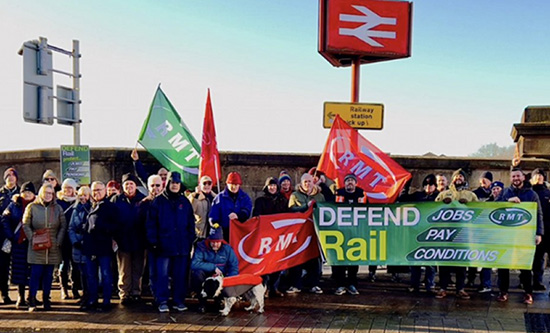
Rampant inflation, rising energy prices and stagnant wages have driven the organised sections of the working class to act against a decade-long decline in their living standards. Strikes have taken place across health, transport, the civil service, post and airport baggage handling. Industrial action has now reached a 30-year-high with 1,628,000 days lost between June and November 2022 – more than the total days lost for the five years 2015-2019:
- In June 2022, 40,000 BT and Openreach workers engaged in the first company-wide strike in 30 years;
- University College Union estimates up to 70,000 higher education workers walked out in November, with further strikes planned in February, March and April;
- In December Royal Mail workers participated in a six-day strike with the Communication Workers Union poised to ballot 100,000 members over further national strikes;
- Unison, Unite and the GMB announced a series of strikes from February through to March involving over 25,000 ambulance staff;
- The National Union of Rail, Maritime and Transport Workers took part in a series of two-day rail strikes across December and January with further strikes planned for February;
- The first Royal College of Nursing strike in its 106-year history took place in January with more planned for February.
Since the 2008 financial crash, there has been a continuous assault on working class living standards as first Labour, and then Tory governments competed over how savage their spending cuts would be. The 2012 Welfare Reform Act and 2013 Universal Credit rollout has created an appalling level of hardship for millions. Yet throughout this period, strike action remained at a minimal level: the official trade union movement confined opposition to ritual demonstrations every six months or so, and locally, trade union branches colluded with Labour-led councils to ensure spending cuts met with no organised resistance.
The rise in industrial action is therefore a welcome change from the passive response to austerity by trade union leaders over the last decade. But whatever they say they are doing, the strikes are being managed in such a way that is preventing any serious challenge to the employers let alone the ruling class. They are intermittent and uncoordinated, with leaders negotiating compromises which may still result in pay cuts for their members.
In July last year privatised UK telecoms giant BT Group imposed a below-inflation pay deal on its 58,000 strong workforce: a flat rate pay increase of £1,500 in April 2022 which was an average pay rise of just 4%. In response, 40,000 BT and Openreach workers went on strike. After eight days, the CWU suspended the strike as it faced calls for an escalation in industrial action and demands for strike pay. The CWU Executive entered closed door negotiations with management and subsequently announced an agreement with a strong recommendation to the membership to accept. The new deal included an additional flat rate increase of £1,500 but this was not backdated to April 2022 but brought forward from April 2023 and made payable from January in monthly payments. It amounted to a de facto pay cut. Immediately hundreds of telecoms workers flooded CWU social media accounts with comments denouncing the deal.
Jo Grady, General Secretary of the UCU, faced wrath from members when she ruled out an indefinite strike in February that had been voted for by the union’s Higher Education Committee. Instead, in her 2023 ‘strategy document’, Grady outlined a proposal for strike ‘blocks’ in February, March and April, ruling out any escalation of industrial action by up to 70,000 university workers. Members reacted with fury, urging others to resist Jo Grady’s ‘attempt to undermine university strikes and union democracy’. Meanwhile RMT and ASLEF leaders are restricting strike action to two to three days a month, a strategy which makes any victory next to impossible. Health unions too are making it clear that what they really want is just negotiations – likely to end in compromise and a pay cut given current levels of inflation.
Although the strikes have remained under tight control, when unions have backed all-out strikes, better deals have been secured. Last October more than 250 Stagecoach workers in Hull took part in continuous strike action which ended after a two-year pay deal worth 20% was accepted. More than 2,000 Arriva London bus drivers went on an all-out strike the same month, eventually securing an 11.2% pay rise after rejecting the 4% originally offered and the all-out strike by bus workers at Arriva North West ended after four weeks with an 11.1% pay rise agreed.
More anti-trade union laws
In January 2023 the government announced a new anti-strike bill outlining sweeping restrictions on the right to strike, allowing employers to force a minimum number of employees to work during industrial action. This repressive legislation would mean that workers who refuse to cross picket lines could be lawfully sacked if they are named as part of meeting minimum service levels. The only acceptable response is organised resistance but so far union leaders have merely promised to fight it through parliament and in the courts.
Workers are faced with an increasingly repressive government, a Labour party with an electoral programme of austerity, and a trade union leadership determined to constrain real resistance, suppressing demands for broader action, shackling the working class to the Labour party and selling out its members. Trade unionists serious about class struggle have to look beyond the Labour movement for allies – the time is right to go out to the people. With millions of people in Britain facing deprivation and poverty, it is now more urgent than ever that the tacit alliance between the trade union leadership – the labour lieutenants of capital – and the ruling class is challenged.
Ellie Mack
FIGHT RACISM! FIGHT IMPERIALISM! 292 February/March 2023




